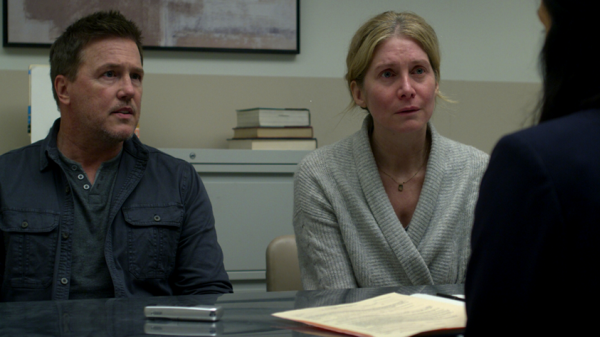‘When Time Got Louder’ asks, ‘Who cares for the caregiver?’

“When Time Got Louder” (2023). Cast: Willow Shields, Lochlyn Munro, Elizabeth Mitchell, Jonathan Simao, Sharon Taylor, Ava Capri, Piper Curda, Aias Dalman, Ava Grace Cooper, Matthew Kevin Anderson, Bronwen Smith, Milo Shandel, Wyatt Cameron, Sindy Lau, Benita Ha, Barry W. Levy, Sean Robert Muik. Director: Connie Cocchia. Screenplay: Connie Cocchia. Web site. Trailer.
The family has sacrificed much in caring for Kayden. Tish gave up her successful career as an interior designer to become a stay-at-home mom for her son. Mark, a construction contractor, has taken on extra work to earn enough money to pay for all of the care Kayden requires, as well as Abbie’s impending schooling. But it’s a decision that has led to Mark being absent more often than many typical husbands and fathers, placing greater strain on the emotional well-being of the household. Meanwhile, Abbie has also made her share of sacrifices, having foregone many of the activities that her high school peers readily enjoy just so that she can dutifully spend time with her brother.
Considering the pressure and anxiety that all of this has placed on the family, one can’t help but wonder how long they can keep this up. Their efforts in caring for Kayden are certainly praiseworthy, but what about their needs? The relationship between Mark and Tish is obviously becoming frayed. And, out of a sense of guilt, Abbie is even considering abandoning her plans to go off to school to stay home with her brother. But are these workable solutions? Are Tish, Mark and Abbie realistically to be expected to put their lives on hold? Are they supposed to willingly sacrifice their hopes, wishes and dreams for Kayden’s sake? Is that fair to them?

There are no easy answers to questions like that. Kayden obviously has a great many needs that must be addressed. But so do Tish, Mark and Abbie. What could they be missing out on in an effort to be dutiful to their son and brother? Even if they were to move forward in meeting their own needs, what kind of an impact would that have on Kayden and his continued well-being? And how would they be looked upon if they did this? Would they be perceived as providing themselves much-needed self-care, or would they be summarily judged as being selfish and “unconcerned”?
Situations like this obviously call for getting creative, particularly when it comes to considering the full range of solution options on the table. But can all of those options truly be envisioned and/or implemented? And, even if so, can those drumming up such possibilities believe in their viability? That’s especially important given the role that our beliefs play in the manifestation of what we experience, the outcome of the conscious creation process, the philosophy that governs the employment of these intangible resources in shaping our existence. It’s not even clear how many of us have heard of or bought into this school of thought, but, if we hope to come up with inventive means for addressing tricky circumstances like those depicted in this film, we had better give them some serious consideration if we hope to find feasible ways to move forward.

This is where the aforementioned envisioning capabilities come into play. Under the conditions present here, it’s apparent that the tried-and-true, readily available solutions have become insufficient, and hopes for them improving significantly and expediently are slim. This is not to suggest that those practices weren’t sufficient at one time, but, as circumstances have changed, new solutions are now called for. Some of these possibilities might not be obvious, or they may have us riddled with doubt about their viability. But that doesn’t mean we shouldn’t look for them or summarily rule them out.
By freeing ourselves of self-imposed limitations, we can expand the range of possibilities open to us. Allowing our imagination to flow without restriction opens up our minds to visualize options never before considered. And, when we infuse those conceptualized ideas with the power of our beliefs, they take on a life of their own, as evidenced by their manifestation right before our eyes. This is what the Petersons must now put to work to come up with the solutions required to fill everybody’s needs.
While it would be ideal if such brainstorms could come to us directly, some of us might need a little help with the envisioning process. In these cases, the wisest course may be to seek out the guidance and insights of specialists with the required expertise. Their experience can prove valuable in devising suggested solutions, providing us with a sense of possibilities we hadn’t considered and can now start focusing on to bring into being. This becomes particularly apparent in the family’s meetings with Claire (Sharon Taylor), a social worker well versed in long-term caregiving options for autistic patients. Some of her suggestions are well met while others are summarily dismissed, but seeking out the possibilities, no matter what they may be, must be done if resolution is ever to be achieved.
In Kayden’s case, Tish, Mark and Abbie need to examine those long-term approaches for reasons other than just what they’re experiencing at the moment. To put it simply, they’re all getting older. Kayden is nearly fully grown, a young man who has the bulk of his life ahead of him. Abbie wants to attend school to develop her talents and career, ventures that are going to require increased time, effort and commitment from her, leaving her with less of each when it comes to caring for her brother. And Tish and Mark are already middle-aged, making it likely that they’ll become less able to carry on with Kayden’s care as they have as they age. While Kayden’s needs can’t be ignored, neither can those of his other family members, as these collective circumstances make clear. The caregivers must be attended to as well.

As this film illustrates, there are myriad benefits to come out of expanding our consciousness through creative exercises like this. For starters, devising unexpected, unconventional solutions can be the best approach for handling challenging situations, like those examined here. Beyond that, though, this practice can also help us build up our “manifestation muscles,” strengthening our capabilities for envisioning favorable outcomes overall, making us more adept at coming up with answers for an array of materialization challenges.
Abbie seems particularly proficient in this regard, especially once she leaves for school. In addition to placing herself in an immersive creative environment that’s ideally suited to her talents, it provides her with the freedom to explore aspects of herself that she couldn’t do as readily when still living at home. Most notably, she begins examining her personal life more than she had, especially when it comes to taking part in same-sex dating with a new love interest, Karly (Ava Capri). Giving herself some breathing room, while still being about to regularly communicate with Kayden by video phone, she’s found a balance that comfortably suits everyone’s needs.
While some of the foregoing might seem patently obvious, it’s important to remember that it’s easy to see that as an outside onlooker. For those ensconced in the midst of such scenarios, the solutions – and how to arrive at them – may not be as apparent. We may be too close to the circumstances, which could cloud our judgment and keep us from seeing a way out. But, by taking a step back and assessing these situations from an enhanced perspective, employing the notions discussed here, and leaving ourselves open to the options, there’s no telling how creative and effective we might become in our problem-solving skills.
Told largely through flashbacks, including during the childhoods of younger versions of Kayden (Aias Dalman) and Abbie (Ava Grace Cooper), this little-known gem sensitively but candidly presents viewers with an up-close look at what families like the Petersons go through to keep life in their households functioning and balanced. Writer-director Connie Cocchia’s heartfelt debut feature examines the loving but hard choices that must be made to take care of everyone’s needs under stressful conditions. Beautifully filmed, skillfully edited and backed by a deftly compiled soundtrack, this tale is effectively brought to life by its superb ensemble cast. The film evokes genuine emotions and does so with an organic authenticity, never becoming schmaltzy, clichéd or manipulative, quite a coup for a first-time feature filmmaker. “When Time Got Louder” is one of those releases that has largely flown beneath the radar, primarily playing the film festival circuit, but, thankfully, this Canadian production is now available for streaming – and a well-worthwhile viewing choice at that.
When close to circumstances like these, it can be difficult to know where to place our boundaries without allowing guilt or emotions to get in the way. How much hands-on involvement is too much? When does a sincere, compassionate sense of obligation become an unhealthy involuntary fixation? And how do we break a cycle that threatens to break us? Keeping our minds open and our intentions balanced is the key, even if learning how to attain it seems overwhelming. But, by letting our consciousness lead us to the answers, we have the opportunity to let everyone win – and what better outcome is there than that?
Copyright © 2023-2024, by Brent Marchant. All rights reserved.



